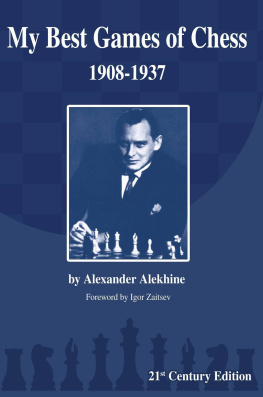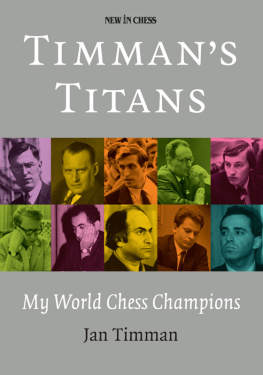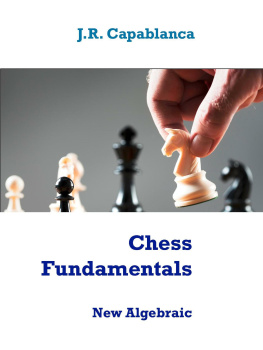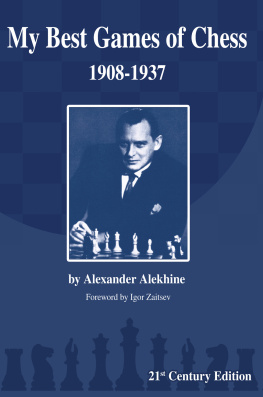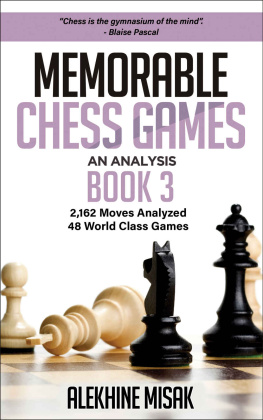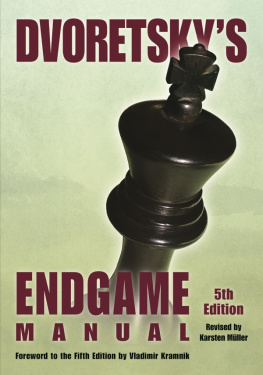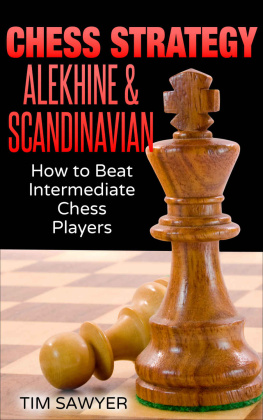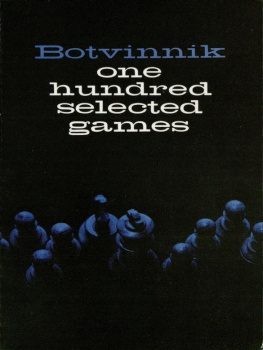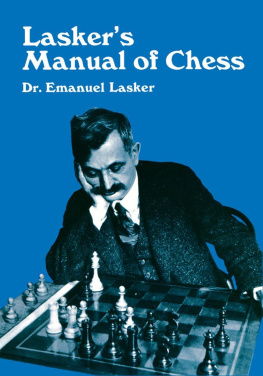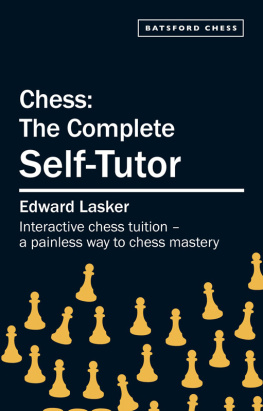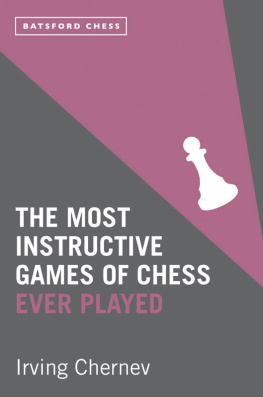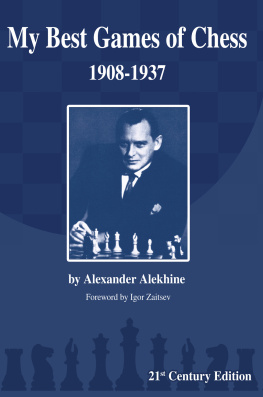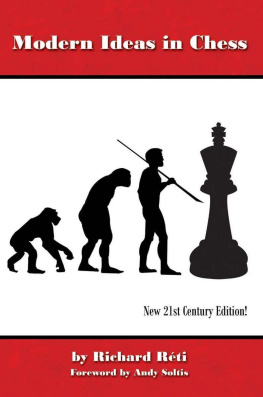My Best Games
of
Chess
1908-1937
by
Alexander Alekhine
Foreword by Igor Zaitsev

2013
Russell Enterprises, Inc.
Milford, CT USA
Alekhines Best Games 1908-1937
by Alexander Alekhine
Copyright 2013 Russell Enterprises, Inc. & Hanon W. Russell
All Rights Reserved. No part of this book may be used, reproduced, stored in a retrieval system or transmitted in any manner or form whatsoever or by any means, electronic, electrostatic, magnetic tape, photocopying, recording or otherwise, without the express written permission from the publisher except in the case of brief quotations embodied in critical articles or reviews.
ISBN: 978-1-936490-69-1
Published by:
Russell Enterprises, Inc.
PO Box 3131
Milford, CT 06460 USA
http://www.russell-enterprises.com
Cover design by Janel Lowrance
Editing and proofreading by Taylor Kingston and Nick Luker


QED stands for Quality, Excellence and Design. The QED seal of approval shown here verifies that this eBook has passed a rigorous quality assurance process and will render well in most eBook reading platforms.
For more information please click here.
Table of Contents
Part I (1908-20)
Part II (1920-23)
Part III (1924-27)
Part IV (1929-34)
Part V (1934-37)
Part VI (1924-33)
Computer-assisted Supplement (free PDF download): http://russell-enterprises.com/excerptsanddownloads.html.
Editors Preface
In playing through an Alekhine game, one suddenly meets a move which simply takes ones breath away C.H.OD. Alexander
When I first became seriously interested in chess, as a teenager in the mid-1960s, Alexander Alekhine quickly became one of my heroes. The record of his accomplishments wresting the World Championship from the seemingly invincible Capablanca in 1927, his overwhelming tournament victories at San Remo 1930 and Bled 1931, his becoming (in 1937) the only man to regain the world title after having lost it, to mention only the brightest highlights was at a level few if any could match. The authors I was then reading generally considered Alekhine to be the greatest player of all time (e.g., Reinfeld in The Human Side of Chess and The Golden Treasury of Chess), or nearly so (for example Chernev put him #2 in The Golden Dozen).
Beyond that, Alekhines games have a quality or more accurately a combination of qualities and a stylistic variety, that are striking and unique. There are scintillating tactical brilliancies, such as against Bogoljubow at Hastings 1922, Asztalos at Kecskemet 1927, and Pirc at Bled 1931. His restless striving for the initiative, and his willingness to enter complications as against Vidmar at Carlsbad 1911, Levenfish at St. Petersburg 1914, or, most strikingly, Rti at Baden-Baden 1925 give his games an energy that made other masters seem torpid. He could produce positional masterpieces that showed deep strategic understanding (e.g. against Nimzowitsch at San Remo 1930, Menchik at Podebrady 1936, or Fine at Kemeri 1937). When attacking and combinative play was not feasible, he produced endgames of indomitable persistence and lethal technical precision, such as against Vidmar at San Remo 1930 and Bled 1931, and (probably most clearly and famously) in the 34th match game against Capablanca, 1927. In 1964, no less an authority than Fischer wrote that Alekhines play was fantastically complicated, more so than any player before or since ... He played gigantic conceptions, full of outrageous and unprecedented ideas.
Alekhines command of opening theory was probably supreme in his time. He seemed at home in any kind of game: open, semi-open, closed openings, romantic gambits, either side of the Ruy Lopez, Queens Gambit, French Defense, Nimzo-Indian etc., and in both old classic lines such as the Scotch and Four Knights, and hypermodern lines such as the Queens Indian. He was an innovator. Besides introducing the eponymous Alekhines Defense to master practice, he is credited by The Oxford Companion to Chess with no fewer than 19 Alekhine variations in such varied lines as the Dutch, Sicilian, French, Ruy Lopez, Queenss Gambit (both Declined and Accepted), Slav, Semi-Slav, and Vienna Game. And his willingness to experiment with perhaps dubious but psychologically potent variations, and to hit opponents with unexpected novelties, was legendary. For example, his use of the Blumenfeld Counter-Gambit against Tarrasch at Bad Pistyan 1922, the Benoni against Bogoljubow and Gygli in two 1934 games, and, most strikingly, his piece sacrifice at the sixth move (!) against Euwe in their 1937 title match.
All these elements combine to make Alekhines chess some of the most exciting, interesting, complex and beautiful ever played and that is not just my opinion; for example GM Reuben Fine, in The Worlds Great Chess Games, ranked him among the top three of all time in this respect, along with Lasker and Fischer. So, it was natural that among the first chess books I ever bought were his best games collections of 1908-23 and 1924-37, in the old descriptive-notation Tartan reprints. Now, decades later, it has been my privilege to edit this single-volume edition of those two classics, in modern figurine algebraic.
The original two volumes have been combined into one without any abridgment. Every move of every game is here, along with all the original notes and variations; all that has been altered is that a few obvious notational, spelling, and typographical errors have been corrected, and occasionally a phrase like and White wins has been changed to the appropriate Informant symbol to save space.
While nothing has been deleted, some (I hope) welcome additions have been made. Many diagrams have been added, especially at points with lengthy notes. Modern opening names and ECO codes have been supplied (in the early 20th century it was common to call anything that began 1.d4 Nf6 just Indian Defense or Queen Pawns Game). The indexes of players and openings now include games embedded in the notes. The Summary of Results has been expanded to include Alekhines entire career, not just the years 1908-37, and many corrections and additions have been made there using Leonard Skinner and Robert Verhoevens Alexander Alekhines Chess Games, 1902-1946, the most authoritative source available. With this marvelous reference, I was also able to correct some name and date errors in the original game and chapter headings.
As a bonus, the reader can obtain an appendix of computer-assisted analytical corrections, additions and enhancements, compiled while going through the games with the Rybka 3 analysis engine. This is provided at no charge as a PDF, which can be downloaded from http://russell-enterprises.com/excerptsanddownloads.html. Admittedly, this silicon-based scrutiny sometimes shows Alekhine to be wrong, but we feel, in the interests of objective chess truth, that such things should not be ignored. And, we like to think that Alekhine, whose success was based in part on thorough self-criticism, would approve.
Those looking for information and insights about Alekhines personal life, in particular his collaboration with the Nazis in WW II, will not find them here, other than the brief summary in Du Monts memoir. For that, interested readers may consult the aforementioned book by Skinner & Verhoeven, or

